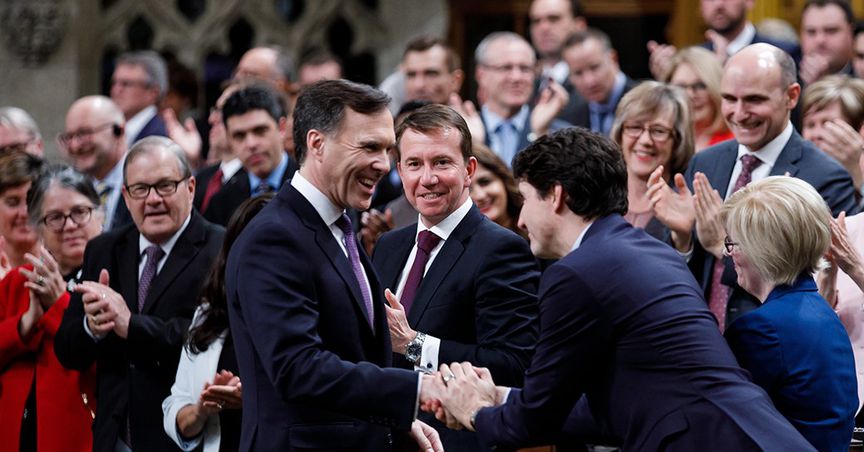(Featured image Source: Government of Canada)
Summary
- Finance Minister Bill Morneau, who’s been at the helm of Canada’s economic affairs since 2015, resigned amid growing tensions with Prime Minister Justin Trudeau.
- Differences cropped up over Canada’s virus recovery spending and billion-dollar green initiatives.
- Inside sources claim that the former FM and his team were sidestepped over crucial policy plans and expenditure by the PM even as the country runs a gigantic C$ 343.2 billion-fiscal deficit.
- Both Trudeau and Morneau are being probed over their involvement in the student grant WE Charity controversy.
- Morneau will now run for the top post at OECD with Trudeau’s support.
- Political circles abuzz with Morneau’s replacement; Economist Mark Carney, Treasury Board chief Jean-Yves Duclos and deputy PM Chrystia Freeland top contenders.
Finance Minister Bill Morneau stepped down from his cabinet position on Monday (August 17) amid reports of increasing rift with Prime Minister Justin Trudeau over federal spending on COVID support programs and green initiatives and WE Charity probe. Morneau’s departure comes in the midst of a deep economic recession and ongoing recovery from COVID-19 pandemic in Canada.
Fifty-seven-year-old Morneau announced his resignation at a snap press conference in Ottawa right before his scheduled face-to-face meet with the PM. He has been a Member of Parliament for Toronto Centre since the Liberals came into power in 2015 and was the only Finance Minister in Trudeau’s tenure.
Speaking at the presser, Morneau said it is time for a new finance minister to deliver on next phase of pandemic and economic recovery plans, adding that he will not run for the next election.
Morneau announced plans to bid for Organisation for Economic Co-operation and Development’s (OECD’s) secretary-general post, with support from Trudeau. The organization’s current chief, Angel Gurría, announced in July that he will step down at the end of his current five-year mandate. In a separate statement, the Prime Minister’s Office informed that it supported Morneau’s bid for the OECD top job.
What went wrong?
Reports of tiff between Trudeau and Morneau became public nearly two weeks ago after multiple media articles suggested that the duo was at loggerheads over the pandemic recovery fund figures and proposed green initiatives.
The quinquagenarian and his team were reportedly overruled in key debates and disagreed with the Prime Minister’s Office (PMO) over COVID policies that Morneau felt were not carefully weighed. He was also deeply unhappy over the budget deficit the federal government was running. The country is forecast to hit C$ 343.2 billion fiscal deficit that is equivalent to nearly 16 percent of economic output – the largest shortfall since the second world war and something Morneau did not want as his legacy.
Conflicts also ensued over the multi-billion-dollar green initiative funds that Morneau believed were excessive. Climate change was an important part of Trudeau’s electoral campaign in 2015. In an effort to wean the Canadian economy off fossil fuels, Trudeau has presented an ambitious budget for achieve the 2021 climate change goals.
To quash all rumors, PM Trudeau voiced his “full confidence” in Morneau on August 12, highlighting his “lead role” in Canada’s response to the pandemic crisis.
However, speculation of Morneau’s ouster gathered storm last week after Mark Carney, the former governor of Bank of Canada and Bank of England, was roped in by the Trudeau government as an informal advisor on the country’s economic recovery plan amid pandemic.
Both Trudeau and Morneau are also being probed over their involvement in the WE Charity controversy.
The conflict-of-interest allegations involving WE Charity emerged following revelations that Morneau did not repay travel costs amounting to C$ 41,000, which covered by the organization, for an overseas trip. He has since written a cheque, but voices demanding his resignation grew louder.
The PM and his family are also facing scrutiny for their involvement with the charity.
Who will replace Bill Morneau?
While the Trudeau government is yet to officially nominate Morneau’s successor, several names for the Finance Minister’s post are doing the rounds in political grapevines.
Among the top contenders to replace Morneau are Carney, Deputy PM Chrystia, Treasury Board President Jean-Yves Duclos and Minister of Foreign Affairs François-Philippe Champagne.
Carney, an economist and a banker, is already assisting the PMO in the country’s economic recovery plan. He’s currently acting as the United Nations' special envoy on climate action and finance and could be appointed as the FM if he declares bid for a seat in Toronto Centre. However, senior government officers told several media outlets that Carney may not get the job.
Freeland, on the other hand, is among Trudeau's most trusted cabinet members and has previously served as minister of foreign affairs and international trade. She negotiated trilateral Canada-United States-Mexico (CUSMA) free trade accord, also known as NAFTA 2.0.
If Freeland does get the post, she would become the first woman finance minister of Canada.
Champagne too has extensive experience for the role and previously had several economic portfolios under his belt including the parliamentary secretary to finance minister, minister of international trade, and infrastructure and communities.
Duclos has the academic credentials required to run this top post, but not enough experience, say experts.
The bottom line remains, whoever takes up the position of finance minister, will have to rough it out in the coming months as the economy sheds its COVID fever.



